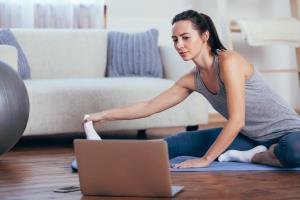Recent Posts
- Exercise - The Path to Results for Anyone Part 1
- THE FIVE STEPS TO FITNESS SUCCESS - Nike is wrong. You can't 'Just Do It'
- THE IMPORTANCE OF CARDIO EXERCISE - A Lifesaving Story
- The Science behind 'Exercise is LIKE Medicine' - How exercise can effect chronic diseases
- EXERCISE IS LIKE MEDICINE! - Its time to change the age old saying
- Stress 101 - What it is and how mindfulness can help - by Curt Woolford, MA, ACC
- EXERCISE FAILURE - THE BIGGEST REASON WHY AND HOW IT'S EASILY AVOIDABLE
- Exercise is Essential for Well-Being During COVID-19 Pandemic
- WHY CONVENTIONAL MEDICINE CAN'T CURE CHRONIC DISEASE by Simplex Health
- H.I.I.T. TRAINING: Really a M.I.S.S.
- Cardio Training - We've been doing it wrong for 40 years!
- Six Pack Abs and the Toned Look What's the secret????
- Ok, what really makes this system so special?
- Finally - The Guaranteed 'guaranteed results' System
- Exercise - It's not that complicated, all you need to know
- Just 'doing' exercise is not right. Doing the 'right exercise' is right.
- Exercise - No longer a choice but a potential life and death necessity
Exercise is Essential for Well-Being During COVID-19 Pandemic

Most adults are well aware of the physical and mental health benefits of exercise and understand the importance of engaging in some form of regular physical activity. As the United States copes with the new coronavirus, COVID-19, pandemic, business closures, social distancing, and changes in everyday schedules are disrupting just about every aspect of ordinary life — and exercise routines are no exception.
Although it might be tempting to skip your workout during these challenging times, public health officials say that exercise — while undoubtedly crucial under normal circumstances — is essential to your physical health and mental well-being during the COVID-19 pandemic. Here’s why you should stay active and how you can exercise safely during coronavirus closures.
How do COVID-19 closures and stay-at-home orders affect exercise routines?
COVID-19 closures of parks, gyms, fitness studios, and other public places changed the public's exercise habits — particularly for people who are not able to exercise at home. Social distancing may further affect people’s ability to exercise, especially if outdoor physical activity is not an option due to shelter-in-place orders, crowded outdoor spaces, bad weather, or other factors.
If you are working from home, you may find that you are sitting for more extended periods. And, changes in your daily routines — such as caring for children who are home from school — may make it more challenging to find time to exercise.
What other COVID-19 concerns may affect physical and mental health?
Coronavirus-related concerns may affect dietary habits, leading to higher calorie consumption that could promote weight gain. Limiting trips to the grocery store, skipping fresh fruits and vegetables in favor of stocking up on calorie-dense, non-perishable foods, and financial difficulties may cause people to opt for less expensive, ultra-processed food options. And all the extra hours you’re spending at home may make you more likely to snack, “stress-bake,” or prepare high-calorie, comfort-food meals.
Additionally, many people are coping with fear, anxiety, stress, financial concerns, sadness, boredom, and isolation — all of which can have a negative effect on diet, physical health, and mental well-being.
Why is exercise important during the COVID-19 pandemic?
Regular exercise is essential for everyone under normal circumstances. However, here are a few reasons why exercise is especially crucial during the COVID-19 pandemic:
- Exercise boosts the immune system: Research shows that regular, moderate-intensity exercise has immune-boosting benefits that may help your body fight off infections, including COVID-19.
- Exercise may prevent weight gain: Exercise can help you burn extra calories caused by dietary changes and offset the effects of sedentary activities.
- Exercise reduces stress and anxiety: Exercise is a proven mood-booster and can help adults reduce stress levels and build emotional resilience.
- Exercise improves sleep: There is evidence that suggests regular exercise helps you fall asleep faster and improves sleep quality — and getting a good night’s sleep has also been found to boost your immune system.
Exercise may be especially beneficial for older adults and people with chronic health conditions, such as diabetes, arthritis, or heart disease. Regular exercise can help to improve balance, flexibility, strength, mobility, and cardiovascular health. Plus, it can boost energy and overall well-being.
How can I stay physically active despite COVID-19 closures?
There are many ways you can be active, even when the gym is closed and you are practicing social distancing. Remote Training Systems will offer help in identifying exercise options that fit your needs
If you have a chronic condition or are an older adult, you should check with your doctor before starting a new home exercise program. Your doctor may want to recommend exercises that are safe for you and will let you know what types of exercise you should avoid.
Here are a few suggestions to help you get moving:
- Start slow: The number one mistake people make is trying to go from a sedentary lifestyle to an over-commitment of exercise time. Lifestyle changes must be introduced slowly and at a level where you can comfortably meet the goal. Start with just two exercise events per week for nothing more than 20-30 minutes. It is far better to hit a smaller goal consistently and build from there than set an unattainable goal and give up before you get started.
- Get outdoors: Walking, cycling, jogging, and hiking can help you get some much-needed fresh air while staying safely away from others. And if done safely in the sunlight you will get your much needed daily dose of Vitamin D.
- Track your effort: Remote Training Systems has a mantra of "If you're not counting it, it doesn't count". When adding exercise to your lifestyle it is important that you set some type of goals. It might be the number of days per week or the number of exercise minutes per week. But the goals need to be measurable and unless you are tracking your effort it will be very easy to not make the changes you set out to make.
- Contact an expert if you need help: Adding exercise to your lifestyle can seem like a daunting task at first. This is where a fitness expert like a personal trainer or a Remote Training Systems Cardio Coach can offer the direction and guidance you need to get started in a safe and effective way.
- Tackle calorie-burning chores: Chores such as mowing the lawn, working in the garden, washing the car, or cleaning out the garage provide excellent opportunities to build muscles and burn calories. In addition to the sense of accomplishment, you will feel after your project, completing a household task will yield even more feel-good benefits.
The bottom line: Although it may take some effort to create and adjust to new fitness routines, regular physical activity has become a necessity in the effort to fight both the potential of catching the covid-19 virus and, limiting the negative effects if you do contract the virus.
